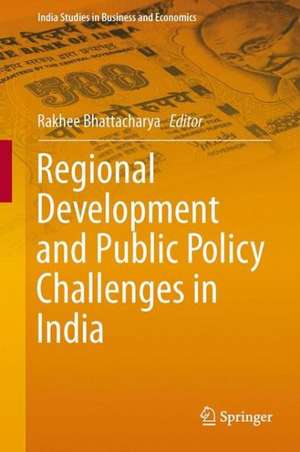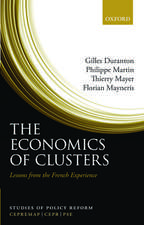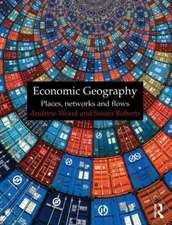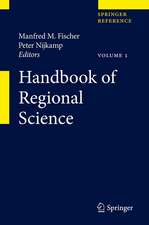Regional Development and Public Policy Challenges in India: India Studies in Business and Economics
Editat de Rakhee Bhattacharyaen Limba Engleză Hardback – 21 iul 2015
| Toate formatele și edițiile | Preț | Express |
|---|---|---|
| Paperback (1) | 643.48 lei 6-8 săpt. | |
| Springer India – 23 oct 2016 | 643.48 lei 6-8 săpt. | |
| Hardback (1) | 649.87 lei 6-8 săpt. | |
| Springer India – 21 iul 2015 | 649.87 lei 6-8 săpt. |
Din seria India Studies in Business and Economics
- 18%
 Preț: 897.65 lei
Preț: 897.65 lei -
 Preț: 361.78 lei
Preț: 361.78 lei - 18%
 Preț: 1006.24 lei
Preț: 1006.24 lei - 18%
 Preț: 952.89 lei
Preț: 952.89 lei - 20%
 Preț: 883.22 lei
Preț: 883.22 lei -
 Preț: 186.41 lei
Preț: 186.41 lei - 15%
 Preț: 636.94 lei
Preț: 636.94 lei - 15%
 Preț: 647.27 lei
Preț: 647.27 lei - 15%
 Preț: 646.30 lei
Preț: 646.30 lei -
 Preț: 409.89 lei
Preț: 409.89 lei -
 Preț: 372.98 lei
Preț: 372.98 lei -
 Preț: 389.88 lei
Preț: 389.88 lei - 18%
 Preț: 894.03 lei
Preț: 894.03 lei - 15%
 Preț: 644.30 lei
Preț: 644.30 lei - 15%
 Preț: 528.30 lei
Preț: 528.30 lei - 15%
 Preț: 643.65 lei
Preț: 643.65 lei - 15%
 Preț: 644.82 lei
Preț: 644.82 lei - 15%
 Preț: 660.37 lei
Preț: 660.37 lei -
 Preț: 386.00 lei
Preț: 386.00 lei - 20%
 Preț: 559.76 lei
Preț: 559.76 lei - 15%
 Preț: 643.99 lei
Preț: 643.99 lei -
 Preț: 386.68 lei
Preț: 386.68 lei -
 Preț: 390.08 lei
Preț: 390.08 lei -
 Preț: 365.76 lei
Preț: 365.76 lei -
 Preț: 393.52 lei
Preț: 393.52 lei - 15%
 Preț: 656.74 lei
Preț: 656.74 lei - 24%
 Preț: 699.24 lei
Preț: 699.24 lei -
 Preț: 369.80 lei
Preț: 369.80 lei - 15%
 Preț: 642.68 lei
Preț: 642.68 lei -
 Preț: 388.90 lei
Preț: 388.90 lei - 15%
 Preț: 645.28 lei
Preț: 645.28 lei -
 Preț: 372.66 lei
Preț: 372.66 lei -
 Preț: 389.17 lei
Preț: 389.17 lei - 20%
 Preț: 569.00 lei
Preț: 569.00 lei - 15%
 Preț: 641.85 lei
Preț: 641.85 lei -
 Preț: 392.97 lei
Preț: 392.97 lei - 15%
 Preț: 643.84 lei
Preț: 643.84 lei - 24%
 Preț: 656.32 lei
Preț: 656.32 lei - 15%
 Preț: 651.34 lei
Preț: 651.34 lei - 15%
 Preț: 641.53 lei
Preț: 641.53 lei - 15%
 Preț: 640.37 lei
Preț: 640.37 lei - 20%
 Preț: 569.86 lei
Preț: 569.86 lei
Preț: 649.87 lei
Preț vechi: 764.55 lei
-15% Nou
Puncte Express: 975
Preț estimativ în valută:
124.35€ • 129.84$ • 102.69£
124.35€ • 129.84$ • 102.69£
Carte tipărită la comandă
Livrare economică 15-29 aprilie
Preluare comenzi: 021 569.72.76
Specificații
ISBN-13: 9788132223450
ISBN-10: 8132223454
Pagini: 369
Ilustrații: XXV, 331 p. 27 illus., 23 illus. in color.
Dimensiuni: 155 x 235 x 24 mm
Greutate: 0.68 kg
Ediția:1st ed. 2015
Editura: Springer India
Colecția Springer
Seria India Studies in Business and Economics
Locul publicării:New Delhi, India
ISBN-10: 8132223454
Pagini: 369
Ilustrații: XXV, 331 p. 27 illus., 23 illus. in color.
Dimensiuni: 155 x 235 x 24 mm
Greutate: 0.68 kg
Ediția:1st ed. 2015
Editura: Springer India
Colecția Springer
Seria India Studies in Business and Economics
Locul publicării:New Delhi, India
Public țintă
ResearchCuprins
Introduction and Overview.- Chapter 1. India’s Growth Performance 2000-2012 - Region Based Perspective (by Biswa Swarup Misra).- Chapter 2. Poor versus Prosperous India (by Madhusudan Ghosh).- Chapter 3. Poverty and Inequality in India: Regional Disparities (by Rakhee Bhattacharya and J. P Bhattacharjee).- Chapter 4. Miseries of the Red Corridor Region of India: What Do the Data Tell Us? (by Jyoti Prasad Mukhopadhyay and Nilanjan Banik).- Chapter 5. Intra and Inter State Inequality in the Northeast Region with Special Reference to Assam (by Meenakshi Rajeev and Azharuddin Akhtar).- Chapter 6. Growth, Development Outcome and Fiscal Balance: How have Indian States Performed? (by Pinaki Chakraborty).- Chapter 7. ‘Inclusive Growth’ and Income Inequality in India under Globalisation: Causes, Consequences and Policy Responses (by Amitabh Kundu).- Chapter 8. Examining Regional Imbalance in China and Comparing with India (by Amitendu Palit).- Chapter 9. The Way Forward: Public Policy to Address Regional Imbalances in India- Process and Outcome (by Rakhee Bhattacharya).- Epilogue. Evolution of Literature on Different Aspects of Regional Inequality in India (by K. L. Krishna).
Notă biografică
Rakhee Bhattacharya is currently the Associate Director and a fellow at Rajiv Gandhi Institute for Contemporary Studies, Rajiv Gandhi Foundation, New Delhi. She is working on various economic challenges of contemporary India. Prior to this assignment, she has worked at others institutes across the country and was Endeavour post-doctoral fellow in Australia. Her research interests are development, disparity, regional economies & conflicts. She has worked on many such issues in India’s Northeast and authored ‘Development Disparities in Northeast India’. In addition to this, she has edited a number of volumes and has written several articles in both national and international journals.
The contributors to this volume are:
Amitabh Kundu, Professor of Economics, Centre for the Study of Regional Development; Dean of the Social Sciences, Jawaharlal Nehru University, New Delhi (India).
Amitendu Pali, Senior Fellow, Institute of South Asian Studies (ISAS), National University of Singapore.
Azharuddin Akhtar, Research Associate, Institute for Social and Economic Change, Bangalore (India).
Biswa Swarup Misra, Professor of Economics and Dean, Xavier Institute of Management, Bhubaneswar (India).
J. P. Bhattacharajee, Deputy Director General, Survey Design & Research Division (SDRD), National Sample Survey Office (NSSO) of MOSPI, Govt of India, Kolkata.
Jyoti Prasad Mukhopadhyay, Research Scholar, Institute for Financial Management and Research, Chennai (India).
K. L. Krishna, Chairman, Madras Institute of Development Studies, Chennai; Founder member, Centre for Development Economics, Delhi School of Economics; former Professor and Director, Delhi School of Economics, New Delhi (India).
Madhusudan Ghosh, Professor of Economics, Department of Economics & Politics, Visva-Bharati, Santiniketan, West Bengal (India).
Meenakshi Rajeev, Professor, Centre for Economic Studies and Policy, Institute for Social and Economic Change, Bangalore (India).
Nilanjan Banik, Associate Professor, Institute for Financial Management and Research (IFMR), Chennai (India).
Pinaki Chakraborty, Professor, National Institute of Public Finance and Policy, New Delhi (India); Honorary Research Scholar, Levy Economics Institute, New York (USA)
The contributors to this volume are:
Amitabh Kundu, Professor of Economics, Centre for the Study of Regional Development; Dean of the Social Sciences, Jawaharlal Nehru University, New Delhi (India).
Amitendu Pali, Senior Fellow, Institute of South Asian Studies (ISAS), National University of Singapore.
Azharuddin Akhtar, Research Associate, Institute for Social and Economic Change, Bangalore (India).
Biswa Swarup Misra, Professor of Economics and Dean, Xavier Institute of Management, Bhubaneswar (India).
J. P. Bhattacharajee, Deputy Director General, Survey Design & Research Division (SDRD), National Sample Survey Office (NSSO) of MOSPI, Govt of India, Kolkata.
Jyoti Prasad Mukhopadhyay, Research Scholar, Institute for Financial Management and Research, Chennai (India).
K. L. Krishna, Chairman, Madras Institute of Development Studies, Chennai; Founder member, Centre for Development Economics, Delhi School of Economics; former Professor and Director, Delhi School of Economics, New Delhi (India).
Madhusudan Ghosh, Professor of Economics, Department of Economics & Politics, Visva-Bharati, Santiniketan, West Bengal (India).
Meenakshi Rajeev, Professor, Centre for Economic Studies and Policy, Institute for Social and Economic Change, Bangalore (India).
Nilanjan Banik, Associate Professor, Institute for Financial Management and Research (IFMR), Chennai (India).
Pinaki Chakraborty, Professor, National Institute of Public Finance and Policy, New Delhi (India); Honorary Research Scholar, Levy Economics Institute, New York (USA)
Textul de pe ultima copertă
This book emphasizes the need for experimenting with more deliberate and rigorous policy processes to attain balanced regional development, which can promote both equity and efficiency in India’s development discourse. The institutional mechanisms for dealing with regional imbalance in India have not been very successful so far.With rising discrepancies in development, demand for autonomy continues along with a new dimension of regionalism arising from submerged identity along with political and economic aspirations, which demanded new channels for solution. So far, attempts to create space for autonomy have possibly not optimally accommodated the conceptual mechanisms like equity and democratic process. Thus democratizing policy process using six pillars of voice: knowledge, objective, fundamental values, implementation framework and public awareness can ensure a better policy outcome for dealing with the persistent challenges of regional disparity in India. This book further focuseson the need for democratizing the policy process for regional development through discussion and inclusion. Such a transition needs innovation in policy regime, which can be attained through following six pillars (i) Democratic voice of stakeholders in policy development and implementation; (ii) Clear policy objectives that advance the common good, based on voice; (iii) Unbiased, sound and comprehensive knowledge and data bases; (iv) Consistency with constitutional values; (v) A sound implementation framework ensuring user-friendliness,transparency and rationality of decision-making processes, effective grievance redress, clear accountability and independent evaluation; (vi) Public awareness and support of policies with relevant and public participation in implementation.
Caracteristici
Redefines the region, which goes beyond center-state frame and suggests a better framework for policy process within democratic values Emphasizes the importance of multi-level federalism over multi-level governance Critically addresses the policy challenge of regional inequality with sound empirical analyses















